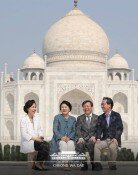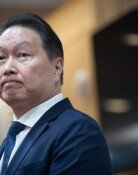[Editorial] The World Wants Economic Growth
[Editorial] The World Wants Economic Growth
Posted January. 23, 2006 03:24,
In a World Economic Forum (WEF) survey of 2,500 business, political, social leaders around the world and 50,000 citizens in 60 countries on this years most important task, the overwhelming answer was the same: economic growth.
Although 65 percent of the respondents had an optimistic view of the worlds economy, their demand for a higher growth rate reflects the fact that without growth, it is difficult to increase jobs or eliminate poverty.
Even 44 percent of so-called progressive professors in Korea said that the highest priority should be placed on acquiring the driving forces for growth, while 36 percent said that solving bi-polarization should be Koreas top priority.
For several years, Korea experienced low-growth that failed to meet potential growth rate. The ripples from this low growth hit Koreas low-income groups the hardest. In order to alleviate these effects, a strategy of recovering growth should be prioritized. But the Roh Moo-hyun government has proudly announced that it will not use any artificial growth policy.
If a policy that increases investment and consumption is not effectively implemented, growth will lag, and employment will stagnate, which is something that the government should feel responsible for.
Measures must be taken to address the current state of investment, job, income and consumption conditions, and to alleviate bipolarization. But the governments only response seems to be an expansion of its fiscal spending. President Rohs statement in his New Years speech on January 18 that more financial resources are needed in order to solve the problem of bipolarization, is an implication that more taxes will be collected. The Ministry of Finance and Economy later tried to minimize Rohs comments by saying, [Roh] did not mention increasing taxes, but the money Roh was referring to can only come from taxpayers pockets.
As if in response to the presidents speech, the National Tax Service initiated audits of 116 of Koreas largest corporations. In addition, the government announced plans to reduce 120 types of tax exemptions and reductions out of 160 at the first half of this year. This is likely to put more of a burden on farmers, fishermen, workers, mid- and small-sized businesses, and middle to low income earners, aggravating bipolarization as a result.
Squeezing corporations and taxpayers for more taxes in order to pay more welfare benefits might temporarily appease some classes, but will not solve the bipolarization problem. On the contrary, a government that wastes taxpayers money in this way will nibble away at the civilian sectors potential for growth and likely exacerbate the problem.
Headline News
- 55%of SNU Hospital professors start indefinite suspension from today
- DP intends to complete the composition of National Assembly this week
- Too high bonus for head of reconstruction associations causes controversy
- 13 infectious diseases sharply increase across the world
- International Skating Union revises major rules







